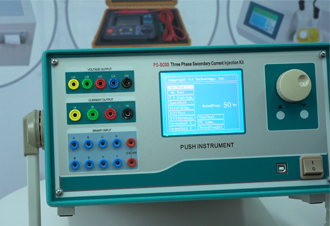TEL:
+86-0312-3189593
 English
English

Telephone:0312-3189593

Email:sales@oil-tester.com
7 月 . 10, 2024 20:38
Back to list
Dielectric resistance testing for assessing the insulation integrity of electrical components
Dielectric resistance test, also known as insulation resistance test, is a critical evaluation process used to assess the integrity of electrical insulation in various equipment and devices. This test is vital in ensuring the safety and reliability of electrically powered systems, as it helps identify any potential issues that could lead to electrical breakdowns or malfunctions.
The dielectric resistance test measures the resistance of the insulation material to electrical current flow, and it is conducted by applying a high voltage between the conductors and the insulation material, while simultaneously measuring the current flowing through the insulation. This test is crucial for detecting any defects or weaknesses in the insulation that could result in electrical leakage or breakdowns.
One of the primary purposes of the dielectric resistance test is to verify the effectiveness of the insulation material in preventing electrical leakage. Insulation materials are designed to act as barriers to prevent the flow of current between conductors and protect against electrical hazards. If the insulation is compromised, it can lead to short circuits, electrical shocks, or fires. By conducting this test, technicians can determine whether the insulation is capable of withstanding the required voltage without breakdown.
Another important aspect of the dielectric resistance test is to assess the overall condition of the insulation. Over time, insulation materials can degrade due to various factors such as moisture, heat, mechanical stress, or aging

dielectric resistance test. By conducting regular dielectric resistance tests, technicians can monitor the insulation's condition and detect any signs of deterioration before they escalate into more severe issues. Furthermore, the dielectric resistance test is essential for ensuring compliance with safety regulations and industry standards. Electrical equipment and devices must meet specific insulation resistance requirements to ensure safe operation and prevent electrical hazards. By conducting this test regularly, organizations can demonstrate their commitment to safety and ensure that their equipment meets the necessary standards. In conclusion, the dielectric resistance test is a critical evaluation process that plays a vital role in ensuring the safety and reliability of electrical systems. By assessing the insulation's resistance to electrical current flow, technicians can detect any defects or weaknesses that could lead to electrical breakdowns or malfunctions. Regular testing helps identify potential issues early on and ensures compliance with safety regulations. Ultimately, the dielectric resistance test is a fundamental tool for maintaining the integrity of electrical insulation and preventing electrical hazards.

dielectric resistance test. By conducting regular dielectric resistance tests, technicians can monitor the insulation's condition and detect any signs of deterioration before they escalate into more severe issues. Furthermore, the dielectric resistance test is essential for ensuring compliance with safety regulations and industry standards. Electrical equipment and devices must meet specific insulation resistance requirements to ensure safe operation and prevent electrical hazards. By conducting this test regularly, organizations can demonstrate their commitment to safety and ensure that their equipment meets the necessary standards. In conclusion, the dielectric resistance test is a critical evaluation process that plays a vital role in ensuring the safety and reliability of electrical systems. By assessing the insulation's resistance to electrical current flow, technicians can detect any defects or weaknesses that could lead to electrical breakdowns or malfunctions. Regular testing helps identify potential issues early on and ensures compliance with safety regulations. Ultimately, the dielectric resistance test is a fundamental tool for maintaining the integrity of electrical insulation and preventing electrical hazards.
Latest news
-
Differences between open cup flash point tester and closed cup flash point testerNewsOct.31,2024
-
The Reliable Load Tap ChangerNewsOct.23,2024
-
The Essential Guide to Hipot TestersNewsOct.23,2024
-
The Digital Insulation TesterNewsOct.23,2024
-
The Best Earth Loop Impedance Tester for SaleNewsOct.23,2024
-
Tan Delta Tester--The Essential Tool for Electrical Insulation TestingNewsOct.23,2024





